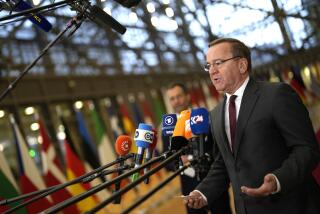NEWS ANALYSIS : With Aid Pledge, Kohl Tries to Show Germany Is Dependable : Geopolitics: His gulf contribution quiets grumbled suggestions that Europe’s richest nation is shirking its duty.
BONN — By boosting West Germany’s contribution to the international effort to contain Iraqi aggression in the Persian Gulf, Chancellor Helmut Kohl is aiming to assure a worried world that a strong and united Germany can be depended on in a crisis.
Kohl’s pledge of $2 billion in military aid and compensation for nations hurt by the trade embargo against Iraq has quieted the grumbled suggestions that West Germany, Europe’s richest nation, was shirking its duty as a defender of democracy.
Until Kohl’s unexpected announcement during weekend talks with U.S. Secretary of State James A. Baker III, Bonn politicians had been lamenting the huge expense of German reunification as a reason for declining to pitch in more for the U.S.-led military buildup against Iraqi President Saddam Hussein.
West German leaders also have been shielding themselves with a constitutional clause that is interpreted--some say conveniently--to prohibit West German troops from taking part in military actions outside of the North Atlantic Treaty Organization.
In addition to promising more money, Kohl assured Baker that his government will pursue a constitutional change to allow West Germany to send troops to quell future conflicts.
“One cannot be the world champion in exports while at the same time, as storm clouds gather, step to the side and say, ‘That should be settled by others,’ ” Kohl said in Leipzig on Sunday, repeating his view that German troops should be standing with Americans against Iraq.
Foreign fears of a resurgence of German militarism made the developed world comfortable with West Germany’s policy of nonintervention in military maneuvers in the past. But the gulf crisis has highlighted the inequity of allowing a wealthy country to sit out the costly and dangerous effort to meet force with force.
Kohl’s shift in tactics to avoid international disrepute has required a delicate balancing act to appease voters who are satisfied with the status quo.
Elections to the leadership of a united Germany will be held Dec. 2, and political wrangling over the outlook for higher tax rates is keeping the lid on West German largess in the gulf and elsewhere.
Kohl’s announcement of further military aid on Saturday followed an agreement reached with the Kremlin last week, which obligates Bonn to pay more than $8 billion to ease and encourage the withdrawal of 370,000 Soviet troops from what is now East Germany.
The rebuilding of a single Germany that culminates in unity ceremonies on Oct. 3 is expected to cost about $100 billion next year alone and could take as long as a decade to bring East German living conditions to the level of the West.
The chancellor has retained his popularity among anxious West Germans by vowing that no new taxes will be levied to bankroll East Germany’s economic recovery--a claim opposition Social Democrats dismiss as a blatant refusal to acknowledge the truth.
A leading member of Kohl’s Christian Democratic Union, Hesse state Gov. Walter Wallmann, broke ranks Sunday in conceding that higher taxes may be unavoidable.
Kohl’s assurance that a united Germany will pull its weight in future military actions may be equally difficult to make good on.
Recent opinion polls show West Germans strongly opposed to taking part in international efforts like Operation Desert Shield.
And constitutional analysts contend that any redrafting of clauses to allow foreign military participation under specific circumstances could, in effect, limit troop dispatches to those exact conditions.
Kohl got around the perceived constitutional problem last year when he sent border police to take part in an international peacekeeping force in Namibia, suggesting that the current constitution may be more flexible than Bonn now chooses to admit.
Proposals to amend the constitution have been embraced by the Social Democrats, who do not share the conservatives’ view that a larger Germany should expand its military might to match.
Foreign Minister Hans-Dietrich Genscher has made clear he has reservations about amending the constitution or making Germany a permanent member of the U.N. Security Council, as has recently been suggested.
“Bonn has not expressed such expectations; we will see how the international community sees it,” Genscher said, arguing that a united Germany should have more responsibility, not more power.
More to Read
Sign up for Essential California
The most important California stories and recommendations in your inbox every morning.
You may occasionally receive promotional content from the Los Angeles Times.











